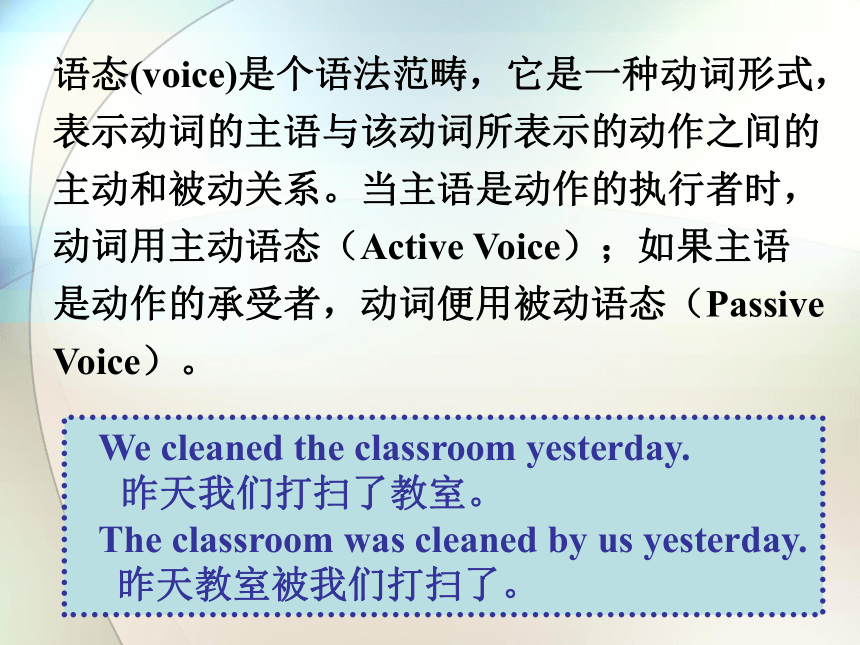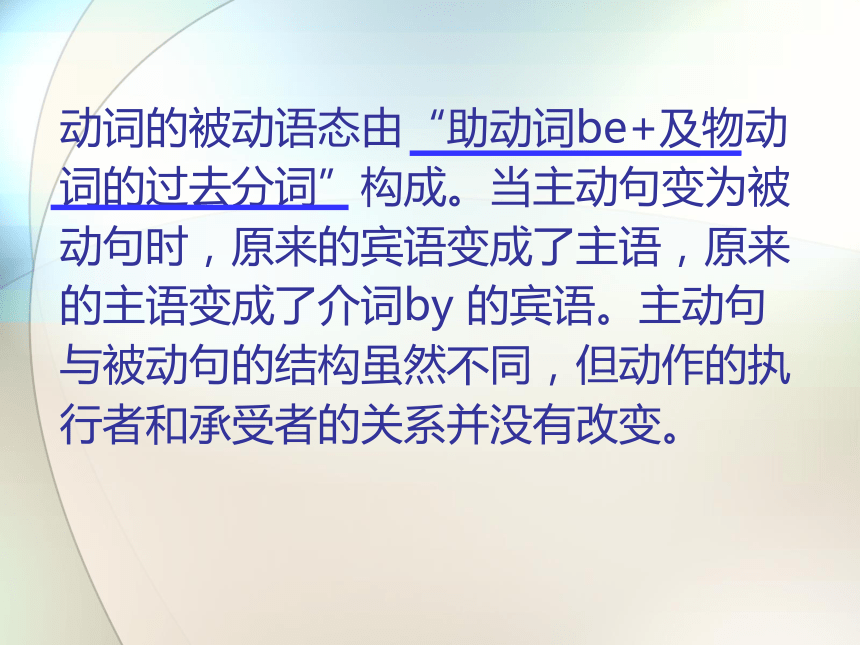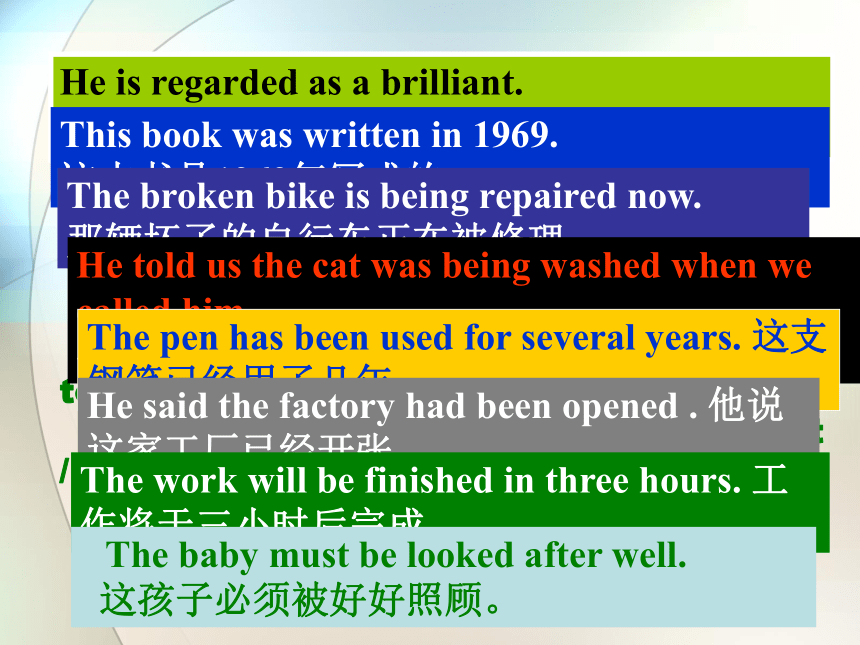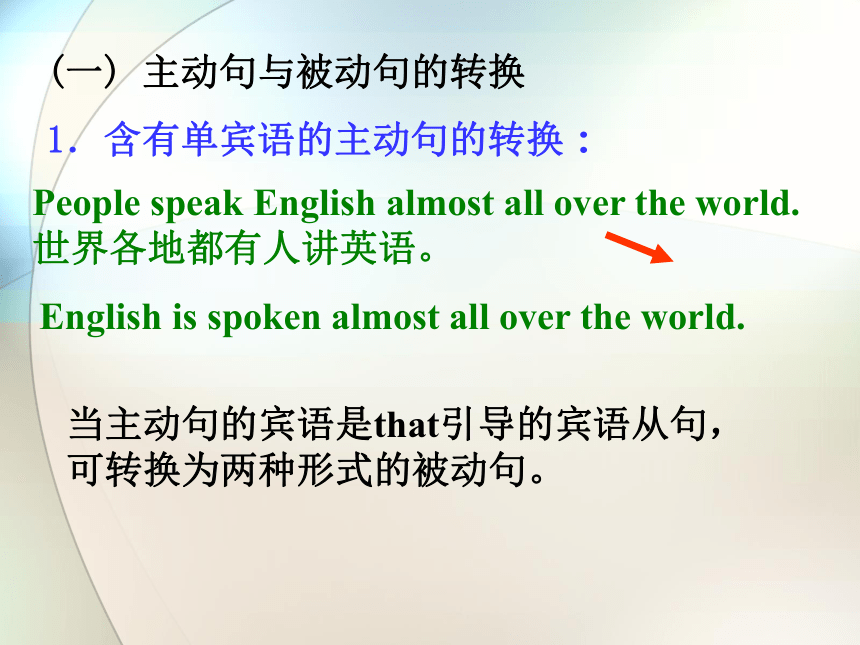一轮复习:被动语态
图片预览









文档简介
(共22张PPT)
被动语态
语态(voice)是个语法范畴,它是一种动词形式,表示动词的主语与该动词所表示的动作之间的主动和被动关系。当主语是动作的执行者时,动词用主动语态(Active Voice);如果主语是动作的承受者,动词便用被动语态(Passive Voice)。
We cleaned the classroom yesterday. 昨天我们打扫了教室。
The classroom was cleaned by us yesterday.
昨天教室被我们打扫了。
动词的被动语态由“助动词be+及物动词的过去分词”构成。当主动句变为被动句时,原来的宾语变成了主语,原来的主语变成了介词by 的宾语。主动句与被动句的结构虽然不同,但动作的执行者和承受者的关系并没有改变。
一般现在时: am / is / are done
一般过去时: was / were done
现在进行时: am / is / are being done
过去进行时: was / were being done
现在完成时: have / has been done
过去完成时: had been done
一般将来时: shall / will be done ; be going to be done
当句中含有情态动词时,句子结构为 can / must / have to…be done
He is regarded as a brilliant. 他被认为很有才气。
This book was written in 1969. 这本书是1969年写成的。
The broken bike is being repaired now. 那辆坏了的自行车正在被修理。
He told us the cat was being washed when we called him. 他告诉我们打电话时他正在给猫洗澡。
The pen has been used for several years. 这支钢笔已经用了几年。
He said the factory had been opened . 他说这家工厂已经开张。
The work will be finished in three hours. 工作将于三小时后完成。
The baby must be looked after well. 这孩子必须被好好照顾。
在被动句中有时用by- 词组,有时不用。一般来说,当动作的执行者为谁不甚清楚,不甚重要或难以说出时,通常不用by。但有时为了强调动作执行者或者由于上下和结构上的需要则必须使用 by 词组。例如:
Hamlet was written by Shakespeare. 《哈姆雷特》是莎士比亚写的。
People speak English almost all over the world. 世界各地都有人讲英语。
当主动句的宾语是that引导的宾语从句,可转换为两种形式的被动句。
English is spoken almost all over the world.
1.含有单宾语的主动句的转换:
(一) 主动句与被动句的转换
People believe that he is an honest boy.
大家认为他是个诚实的孩子。
2.含有双宾语的主动句的转换
I gave the book to Mr. Smith yesterday. 昨天我给了史密斯先生一本书。
It is believed that he is an honest boy.
The boy is believed to be an honest one.
The book was given to Mr. Smith yesterday ( by me).
2) 把宾语从句里的主语变成被动句的主语,同时把宾语从句中的谓语变成不定式短语。
1) 用先行的it作形式主语,把宾语从句变成后置的主语从句;
3. 含有介词动词的主动句的转换
They have never listened to him.
人家从不听他的话。
表示被动意义的主动句:
Cotton feels soft. 棉花摸上去很柔软。
Ripe apples pick easily. 熟了的苹果容易摘下来。
He has never been listened to.
Mr. Smith was given a book yesterday (by me).
语态转换
1. He teaches English in our school.
2. She gave me a book.
English is taught in our school by him.
I was given a book by her./A book was given to me by her.
口诀1:宾提前变主,主变介by宾,被动be加done,时态看主动。
口诀2:如 遇双宾语,最好变间宾,如若变直宾,间宾前加to / for (pass, lend, buy, write, bring, show, tell…)
3. He made me do the work.
I was made to do the work by him.
口诀3:这些动词真奇怪,主动句中to 离开,被动
句中to回来.(feel, listen to, hear, let have, make,
look at, see, watch…)
4.They take good care of the baby.
The baby is taken good care of by them.
注意:含动词词组的被动语态,须将其看作一个
整体,不可把它们分隔开来。
有些情况下动词的主动形式也可以表示被动意义。
一、表示“开始”;“结束”类的动词。常见的这类动词有begin, start, open, close, end, finish, stop等。例如:
School begins in September.
The stores in this area open later at weekends than at weekdays.
二、主语是物,谓语是表示主语特征或属性的动词。常见的这类动词有write, read, wear, wash, clean, sell, run, lock等。这些动词常与副词或否定词连用。例如:
The machine runs well.
This pen writes quite smoothly.
The bookshelf hardly sells.
三、表示主语状态特征的连系动词:look, feel, smell, taste, sound, prove, appear等。例如:
—Do you like the material
—Yes, it ________ very soft.
A. is feeling B. felt C. feels D. is felt
C
Your idea sounds reasonable.
What he said proved to be correct.
四、动名词主动形式表示被动意义
1. 在need, require, want(需要)等动词后,表示某物(人)要进行……处理时,后接动名词一般式的主动形式作宾语表示被动意义,相当于不定式的被动式。例如:
—You've come just in time to help us.
—Fine, what requires doing (=Fine, what requires to be done )
This sentence needs ________ .
A. an improvement B. improve C. improving D. improved
C
2. be worth 后接动名词的主动式表示被动意义。
His suggestion is not worth considering.
五、动词不定式的主动形式表示被动意义
不定式修饰的名词或代词和不定式有逻辑
上的主谓关系时。例如:
The next train to arrive was from New York.
2. 作定语的不定式与被修饰的名词或代词有
逻辑上的动宾关系,且句子的主语或间接
宾语与该不定式有逻辑上的主谓关系时。
Please give me something to eat. I have a lot of work to do today.
3. 用在作表语或宾语补足语的形容词后面的不
定式,如果与句子的主语或宾语有动宾关系
时,一般用主动形式。例如:
His speech in English was difficult to follow.
Do you think him easy to get along with
(间接宾语me是to eat的逻辑主语)
(主语I是to do的逻辑主语)
(不定式与宾语有动宾关系)
(状语to follow与主语有动宾关系)
1.It suddenly snowed while Mary ____for the bus.
A.waited B.waits C.was waiting D.was waited
2.A big power station( )______in my home town now.
A.has been built B.is being built C.has built D. is building
3.Stamps______by people for sending letters.
A. use B. using C.used D. are used.
4.Must old people_____to politely
A. speak B. spoken C. be spoke D. be spoken
C
B
D
D
5.Bike mustn’t _____everywhere.
A. be up B. be put C. put C. putting
6.The woman fell off the bike and ____on the road.
A. lay B. was lain C. lied D. has lain
7.The old man and the children_____in our country.
A.must take good care B.must be take good care of
C. must take good care of
D. must be taken good care of
8.Granny Wang told the little children that the sun___
From the east.
A. has risen B. rise C. rises D. is risen
B
A
D
C
9.All trees must_____well when it is dry.
A.be water B.watering C.water D.be watered
10.__I think the shop_____________.
__No,it’s open. It_____________at six.
Asked B. will be asked
C. closed; closes D. closes; is closed
11.This bike is made in America. It’s____for travelling.
A.use B.using C.to use D.used
D
D
D
1.The key __for locking the classroom door.
A.uses B. is used C.is using D.use
2.A new school __over there in two years.
A.may built B.may be built C. is built
3. He was made __yesterday.
A.cry B.to cry C.crying D.to be cried
4.The PRC__on October 1,1949.
A.was found B. is found C.was founded
D.is founded
5.A talk on Chinese history__in the school hall next week.
A.is given B.has been given C.will be given
D. will give
B
B
B
C
C
Exercise
Windows_____ of glass.
A. be made B. is made
C. are made D. been made
2. The house_____ in 2004.
A. is built B. is building
C. was built D. used
3. A coat can_____ for keeping warm.
A. be used B. is used
C. been used D. used
C
C
A
4. Watches____ Shanghai last long.
A. are made in B. is made
C. are made from D. made
5. This desk is made _____ wood.
A. of B. from C. in D. by
6. The things on show were ____ the old days.
A. used B. used to C. used for D. used in
7. Silk _____ in Suzhou and Hangzhou.
A. is produced B. are produced
C. produced D. is produces
A
A
D
A
被动语态
语态(voice)是个语法范畴,它是一种动词形式,表示动词的主语与该动词所表示的动作之间的主动和被动关系。当主语是动作的执行者时,动词用主动语态(Active Voice);如果主语是动作的承受者,动词便用被动语态(Passive Voice)。
We cleaned the classroom yesterday. 昨天我们打扫了教室。
The classroom was cleaned by us yesterday.
昨天教室被我们打扫了。
动词的被动语态由“助动词be+及物动词的过去分词”构成。当主动句变为被动句时,原来的宾语变成了主语,原来的主语变成了介词by 的宾语。主动句与被动句的结构虽然不同,但动作的执行者和承受者的关系并没有改变。
一般现在时: am / is / are done
一般过去时: was / were done
现在进行时: am / is / are being done
过去进行时: was / were being done
现在完成时: have / has been done
过去完成时: had been done
一般将来时: shall / will be done ; be going to be done
当句中含有情态动词时,句子结构为 can / must / have to…be done
He is regarded as a brilliant. 他被认为很有才气。
This book was written in 1969. 这本书是1969年写成的。
The broken bike is being repaired now. 那辆坏了的自行车正在被修理。
He told us the cat was being washed when we called him. 他告诉我们打电话时他正在给猫洗澡。
The pen has been used for several years. 这支钢笔已经用了几年。
He said the factory had been opened . 他说这家工厂已经开张。
The work will be finished in three hours. 工作将于三小时后完成。
The baby must be looked after well. 这孩子必须被好好照顾。
在被动句中有时用by- 词组,有时不用。一般来说,当动作的执行者为谁不甚清楚,不甚重要或难以说出时,通常不用by。但有时为了强调动作执行者或者由于上下和结构上的需要则必须使用 by 词组。例如:
Hamlet was written by Shakespeare. 《哈姆雷特》是莎士比亚写的。
People speak English almost all over the world. 世界各地都有人讲英语。
当主动句的宾语是that引导的宾语从句,可转换为两种形式的被动句。
English is spoken almost all over the world.
1.含有单宾语的主动句的转换:
(一) 主动句与被动句的转换
People believe that he is an honest boy.
大家认为他是个诚实的孩子。
2.含有双宾语的主动句的转换
I gave the book to Mr. Smith yesterday. 昨天我给了史密斯先生一本书。
It is believed that he is an honest boy.
The boy is believed to be an honest one.
The book was given to Mr. Smith yesterday ( by me).
2) 把宾语从句里的主语变成被动句的主语,同时把宾语从句中的谓语变成不定式短语。
1) 用先行的it作形式主语,把宾语从句变成后置的主语从句;
3. 含有介词动词的主动句的转换
They have never listened to him.
人家从不听他的话。
表示被动意义的主动句:
Cotton feels soft. 棉花摸上去很柔软。
Ripe apples pick easily. 熟了的苹果容易摘下来。
He has never been listened to.
Mr. Smith was given a book yesterday (by me).
语态转换
1. He teaches English in our school.
2. She gave me a book.
English is taught in our school by him.
I was given a book by her./A book was given to me by her.
口诀1:宾提前变主,主变介by宾,被动be加done,时态看主动。
口诀2:如 遇双宾语,最好变间宾,如若变直宾,间宾前加to / for (pass, lend, buy, write, bring, show, tell…)
3. He made me do the work.
I was made to do the work by him.
口诀3:这些动词真奇怪,主动句中to 离开,被动
句中to回来.(feel, listen to, hear, let have, make,
look at, see, watch…)
4.They take good care of the baby.
The baby is taken good care of by them.
注意:含动词词组的被动语态,须将其看作一个
整体,不可把它们分隔开来。
有些情况下动词的主动形式也可以表示被动意义。
一、表示“开始”;“结束”类的动词。常见的这类动词有begin, start, open, close, end, finish, stop等。例如:
School begins in September.
The stores in this area open later at weekends than at weekdays.
二、主语是物,谓语是表示主语特征或属性的动词。常见的这类动词有write, read, wear, wash, clean, sell, run, lock等。这些动词常与副词或否定词连用。例如:
The machine runs well.
This pen writes quite smoothly.
The bookshelf hardly sells.
三、表示主语状态特征的连系动词:look, feel, smell, taste, sound, prove, appear等。例如:
—Do you like the material
—Yes, it ________ very soft.
A. is feeling B. felt C. feels D. is felt
C
Your idea sounds reasonable.
What he said proved to be correct.
四、动名词主动形式表示被动意义
1. 在need, require, want(需要)等动词后,表示某物(人)要进行……处理时,后接动名词一般式的主动形式作宾语表示被动意义,相当于不定式的被动式。例如:
—You've come just in time to help us.
—Fine, what requires doing (=Fine, what requires to be done )
This sentence needs ________ .
A. an improvement B. improve C. improving D. improved
C
2. be worth 后接动名词的主动式表示被动意义。
His suggestion is not worth considering.
五、动词不定式的主动形式表示被动意义
不定式修饰的名词或代词和不定式有逻辑
上的主谓关系时。例如:
The next train to arrive was from New York.
2. 作定语的不定式与被修饰的名词或代词有
逻辑上的动宾关系,且句子的主语或间接
宾语与该不定式有逻辑上的主谓关系时。
Please give me something to eat. I have a lot of work to do today.
3. 用在作表语或宾语补足语的形容词后面的不
定式,如果与句子的主语或宾语有动宾关系
时,一般用主动形式。例如:
His speech in English was difficult to follow.
Do you think him easy to get along with
(间接宾语me是to eat的逻辑主语)
(主语I是to do的逻辑主语)
(不定式与宾语有动宾关系)
(状语to follow与主语有动宾关系)
1.It suddenly snowed while Mary ____for the bus.
A.waited B.waits C.was waiting D.was waited
2.A big power station( )______in my home town now.
A.has been built B.is being built C.has built D. is building
3.Stamps______by people for sending letters.
A. use B. using C.used D. are used.
4.Must old people_____to politely
A. speak B. spoken C. be spoke D. be spoken
C
B
D
D
5.Bike mustn’t _____everywhere.
A. be up B. be put C. put C. putting
6.The woman fell off the bike and ____on the road.
A. lay B. was lain C. lied D. has lain
7.The old man and the children_____in our country.
A.must take good care B.must be take good care of
C. must take good care of
D. must be taken good care of
8.Granny Wang told the little children that the sun___
From the east.
A. has risen B. rise C. rises D. is risen
B
A
D
C
9.All trees must_____well when it is dry.
A.be water B.watering C.water D.be watered
10.__I think the shop_____________.
__No,it’s open. It_____________at six.
Asked B. will be asked
C. closed; closes D. closes; is closed
11.This bike is made in America. It’s____for travelling.
A.use B.using C.to use D.used
D
D
D
1.The key __for locking the classroom door.
A.uses B. is used C.is using D.use
2.A new school __over there in two years.
A.may built B.may be built C. is built
3. He was made __yesterday.
A.cry B.to cry C.crying D.to be cried
4.The PRC__on October 1,1949.
A.was found B. is found C.was founded
D.is founded
5.A talk on Chinese history__in the school hall next week.
A.is given B.has been given C.will be given
D. will give
B
B
B
C
C
Exercise
Windows_____ of glass.
A. be made B. is made
C. are made D. been made
2. The house_____ in 2004.
A. is built B. is building
C. was built D. used
3. A coat can_____ for keeping warm.
A. be used B. is used
C. been used D. used
C
C
A
4. Watches____ Shanghai last long.
A. are made in B. is made
C. are made from D. made
5. This desk is made _____ wood.
A. of B. from C. in D. by
6. The things on show were ____ the old days.
A. used B. used to C. used for D. used in
7. Silk _____ in Suzhou and Hangzhou.
A. is produced B. are produced
C. produced D. is produces
A
A
D
A
同课章节目录
- 词法
- 名词
- 动词和动词短语
- 动词语态
- 动词时态
- 助动词和情态动词
- 非谓语动词
- 冠词
- 代词
- 数词和量词
- 形容词副词及其比较等级
- 介词和介词短语
- 连词和感叹词
- 构词法
- 相似、相近词比较
- 句法
- 陈述句
- 一般疑问句和否定疑问句
- 特殊疑问句及选择疑问句
- 反意疑问句
- 存在句(There be句型)
- 宾语从句
- 定语从句
- 状语从句
- 主谓一致问题
- 简单句
- 并列句
- 复合句
- 主谓一致
- 主、表语从句
- 名词性从句
- 直接引语和间接引语
- 虚拟语气
- 感叹句
- 强调句
- 倒装句
- 祈使句
- 句子的成分
- 句子的分类
- 题型专区
- 单项选择部分
- 易错题
- 完形填空
- 阅读理解
- 词汇练习
- 听说训练
- 句型转换
- 补全对话
- 短文改错
- 翻译
- 书面表达
- 任务型阅读
- 语法填空
- 其他资料
